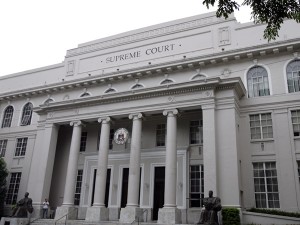MANILA, Philippines—The provision under the Cybercrime Prevention Act which allows the prosecution of cyber libel and violation of the Revised Penal Code at the same time is “clearly infirm,” a justice of the Supreme Court said Tuesday.
Under Section 7 of Republic Act 10175 or the Cybercrime Prevention Act of 2012, if prosecuted for libel under this law, the violator can still be prosecuted for violation under the Revised Penal Code which also provides penalty and defines the crime of libel.
Associate Justice Teresita Leonardo de Castro said the law allows prosecution for both violation of the Revised Penal Code and a special law.
She cited the case of bouncing checks which prosecutes one for Estafa under the RPC and violation of BP22 at the same time.
However, she said, in the bouncing check case, there is a distinguishing element which allows simultaneous violation of both laws-in RPC, there has to be the element of deceit while under BP22, the issuer of the check is prosecuted for mere issuing a bouncing check.
“But in this case, there is no additional element to distinguish crime under this law [RA 10175] and what is included in the RPC. What is mentioned in Section 7 is not an element of the crime. What section 6 penalizes is the same as that in the RPC,” De Castro said.
Representative Neri Colmenares told the high court that simultaneous prosecution for libel is a violation of the right against double jeopardy where no person can be charged for the same offense twice.
Associate Justice Diosdado Peralta who echoed De Castro’s observation took note that while lawmakers increased the penalty of Internet libel by one degree or six years and one day to 12 year imprisonment from six months and 1 day to 6 years, it was not justified why the penalty was increased.
“By increasing the penalty by 1 degree, you are already providing for a different kind of libel but no new element was introduced…Section 7 is clearly infirm. There is something wrong with this,” Peralta said.
The oral argument is still ongoing.
